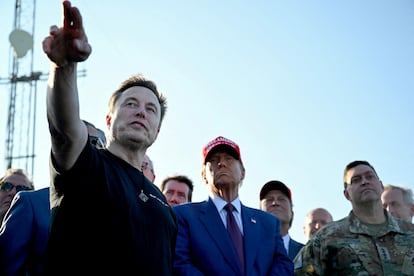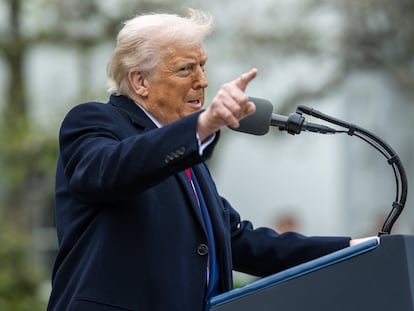How Trump is undermining the science system that made America great
Research cuts are threatening the country’s global dominance and herald a world with fewer drugs and more preventable deaths


The world’s finest science system is experiencing the darkest moment in its history. The cuts proposed by President Donald Trump are unprecedented since World War II, when the United States consolidated its leadership in scientific research thanks to a massive investment of federal funds. Much of the country’s current wealth depends on this system, which could collapse surprisingly quickly, according to a growing number of American scientists.
Trump’s cuts will have impacts across the globe, to a surreal extent. Young women in South Africa are being forced to remove the contraceptive rings that protected them from HIV because they were funded by USAID, the federal aid agency Trump wants to shut down. Similarly, cuts in Washington could cause hundreds of thousands of premature deaths, millions of cases of AIDS, polio, and malaria, and slow the development of new treatments for cancer, Alzheimer’s, and other diseases in the rest of the world.
Trump wants to lay off tens of thousands of federal agency workers and cancel billions of dollars in funding. A 10,000-job cut is expected in the Department of Health alone. Added to the early retirements, one in four jobs will be eliminated from this agency, which includes the Centers for Disease Control (CDC), essential for controlling pandemics, the Food and Drug Administration (FDA), and the National Institutes of Health (NIH), the world’s largest public biomedical research organization. Many of the new drugs approved each year for cancer and other diseases are based on research funded by this global scientific giant. Some of these cuts are currently being halted by judges, but if upheld, they could be a death sentence for research centers and universities across the country.
Most of Trump’s cuts stem from executive orders signed in his early days in office and from the federal slimming plan designed by Elon Musk, head of the Department of Government Efficiency. The federal early retirement plan is officially called “Fork in the Road.” That was the subject of the email Musk sent to Twitter employees in 2022 after acquiring the company and before launching a campaign of mass layoffs.
NASA is one of the few agencies where the layoffs demanded by the government have not yet been quantified, but some positions viewed as troublesome by the administration have already been eliminated, such as that of chief scientist, held by climatologist and UN collaborator Katherine Calvin. The upcoming cuts could change the course of space exploration in the coming years. The hottest topic is whether the project to land the first woman and the first non-white person on the Moon in 2027 will be abandoned and focus switched instead to Mars, as advocated by Musk. The tech magnate is NASA’s main contractor with SpaceX rockets. The next NASA administrator will be Jared Isaacman, a millionaire close to Musk. But on Monday, Isaacman assured in a closed-door meeting with senators that the agency’s plan will continue to be to go first to the Moon and then to Mars, contrary to Musk’s advocacy, Reuters reports.
The attack on American science is particularly aggressive in areas where Trump sees ideology. For example, the main climate monitoring agency, the National Oceanic and Atmospheric Administration, has banned its scientists from working on international reports on climate change and canceled grants for research projects in this field.
Diversity, equity, and inclusion policies have also been targeted by the White House, which sees them as “radicalism and waste.” NASA may face problems in its astronaut recruitment process due to new regulations seeking to eliminate diversity criteria. Meanwhile, the National Science Foundation, focused on the search for new energies, is closely scrutinizing every project it funds to ensure it complies with the president’s executive orders.
One of the most alarming aspects is the growing influence of pseudoscientific theories in public health policies. Robert Kennedy Jr., who heads the Department of Health, has promoted anti-vaccine theories and ordered official studies on a supposed link between vaccines and autism, a hypothesis discredited decades ago. His recommendation to use cod liver oil against measles may be behind poisonings in children in the state of Texas, one of the hardest hit by the epidemic of this infectious disease, for which there is an effective vaccine. The NIH has also canceled funding for studies on vaccine hesitancy, and the CDC’s Immunization Advisory Committee has postponed key meetings since Kennedy took office. In the epidemiological field, cuts to the CDC and the United States’ withdrawal from the World Health Organization coincide with the worst outbreak of avian flu in history, which has taken root on the country’s dairy farms.
Some of the nation’s top universities risk losing millions or billions of dollars in federal funding. Many have frozen admissions, keeping entire graduating classes in suspense and directly affecting the research capacity of prestigious research groups like David Baker’s at the University of Washington, winner of the latest Nobel Prize in Chemistry. In recent days, the Trump administration has opened a new avenue of political attack on universities like Harvard, in this case for alleged antisemitism.
The import tariffs announced by the Trump administration threaten to make the situation even worse. Many of the materials commonly used in laboratories come from countries like China, and the lenses for many microscopes come from Europe. Trump’s economic policies could raise the cost of research by 20% or more, according to Nature.
The other major battleground is the deletion of websites, files, and public data. The Trump administration has attempted to remove thousands of government pages on vaccines, addiction among military veterans, child poverty, and climate change. Some of that content has been made available again due to court rulings. Similarly, there are volunteer campaigns to copy and keep available the deleted information.
The country’s scientific community has endured all these attacks virtually in silence. In the early stages of the crisis, very few scientists dared to publicly criticize Trump, fearing both cuts in funding and personal reprisals against them or their families. The prestigious journal Science has described these cuts as “a direct blow” to American science, while Nature has urged scientists to “speak truth to power” and not resign themselves to four years of devastation. According to a survey by the journal, 75% of the country’s scientists are considering leaving, and Europe is seeking to take advantage of the potential exodus.
Last week, nearly 2,000 leading scientists denounced Trump as “destroying” the country’s scientific system. “If U.S. research is dismantled, we will lose our leadership,” warned the signatories, including several Nobel laureates, and other countries will lead the development of new treatments, alternative energy sources, and other strategic technologies. Reversing the damage could take “decades,” they warned.
American science is facing an “existential crisis,” Carol Greider, Nobel Prize winner in Medicine in 2009 and signatory of the letter, told New Scientist. The researcher explains that the current cuts are unprecedented since Vannevar Bush laid the foundations of the current U.S. scientific system, based on subsidies, in 1945. “Science is a frontier without limits,” wrote the scientist and key figure in the government. Originally, its objective was to develop the atomic bomb and other key technologies to win the Second World War, but it later became the highest-paid and most successful scientific system in the world, capable of taking astronauts to the moon, inventing the internet, and reading the human genome for the first time.
Every dollar spent by the NIH generates more than twice as much money in profits and eight times as much private investment in research and development, according to a report by the Medical Research Union. Trump’s cuts threaten not only the advancement of knowledge, but also the foundation of productivity in the richest country in the world. Attacking the scientific establishment, economist Sabrina Howell sums up, “is like killing the goose that lays the golden eggs.”
Sign up for our weekly newsletter to get more English-language news coverage from EL PAÍS USA Edition
Tu suscripción se está usando en otro dispositivo
¿Quieres añadir otro usuario a tu suscripción?
Si continúas leyendo en este dispositivo, no se podrá leer en el otro.
FlechaTu suscripción se está usando en otro dispositivo y solo puedes acceder a EL PAÍS desde un dispositivo a la vez.
Si quieres compartir tu cuenta, cambia tu suscripción a la modalidad Premium, así podrás añadir otro usuario. Cada uno accederá con su propia cuenta de email, lo que os permitirá personalizar vuestra experiencia en EL PAÍS.
¿Tienes una suscripción de empresa? Accede aquí para contratar más cuentas.
En el caso de no saber quién está usando tu cuenta, te recomendamos cambiar tu contraseña aquí.
Si decides continuar compartiendo tu cuenta, este mensaje se mostrará en tu dispositivo y en el de la otra persona que está usando tu cuenta de forma indefinida, afectando a tu experiencia de lectura. Puedes consultar aquí los términos y condiciones de la suscripción digital.
